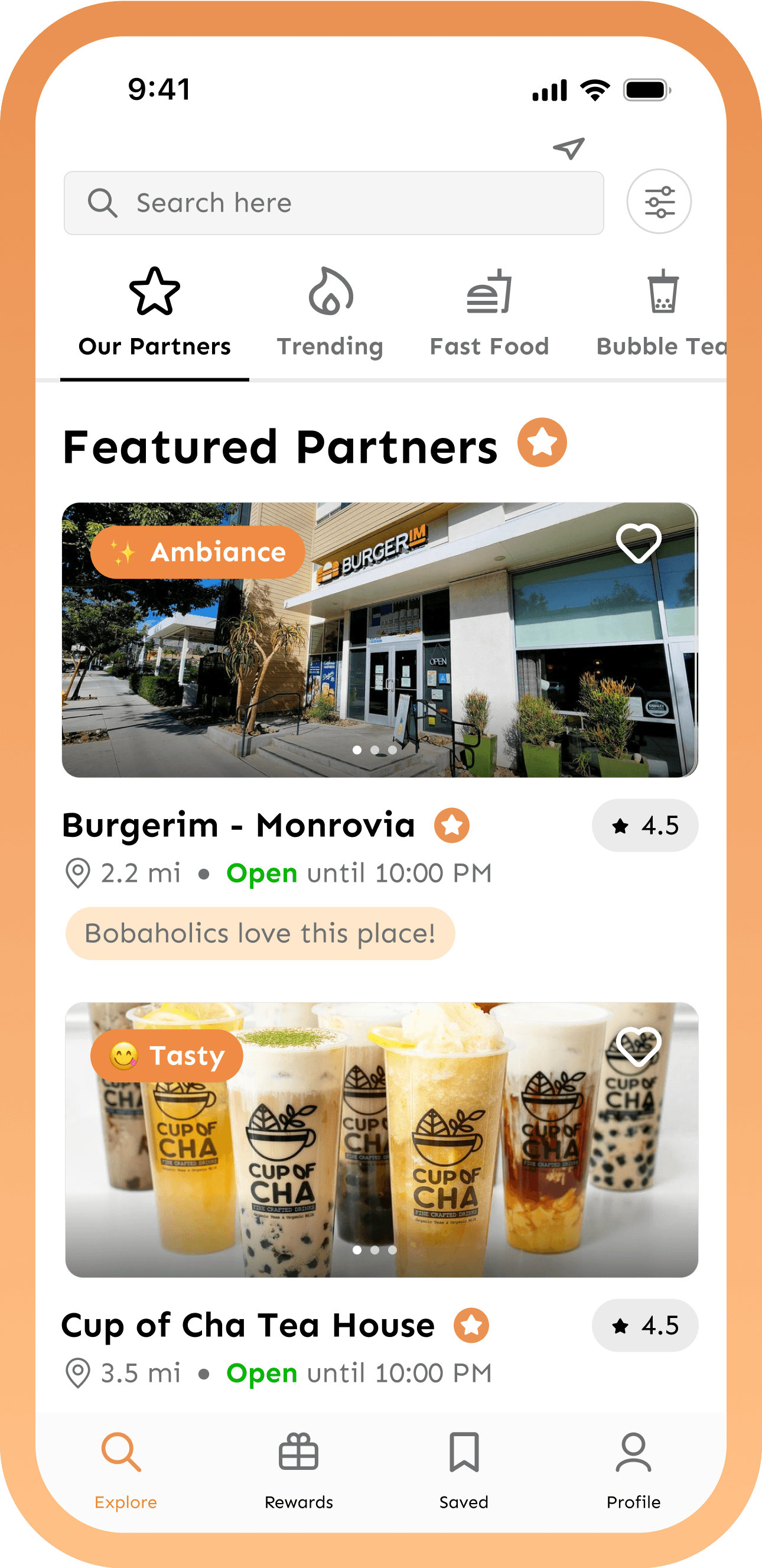SeekEats is a platform that connects foodies with local restaurant owners, offering exclusive discounts and promoting small businesses in the Los Angeles area.
It started with a visionary concept that uniquely combined fun and food, transforming the way users discover and indulge in their favorite local eats. The platform's ingenious foundation revolved around an engaging poll system, enticing users to answer entertaining daily polls and earn redeemable points for delightful local food and drink deals.
Research
During the initial phase, I conducted a thorough competitive analysis to understand the strengths and weaknesses of existing food discovery and discount platforms. Key competitors included popular food apps, restaurant review platforms, and other discount-based services. In order to draw in and keep users, the research stressed the value of eye-catching graphics and tailored interactions. We were able to see patterns emerge amongst the apps, pointing to elements we could include in our own product and others we should steer clear of.
Wireframe Competitor Analysis - Identifying Strengths and Weaknesses of Each App

Wireframe Competitor Analysis - Identifying Strengths and Weaknesses of Each App
Research
Gathering from user interviews, here are the points SeekEats aims to solve:
User Clarity and Consistency: Users value clarity and consistency throughout the app. Displaying distances in "mi" (miles) instead of "m" (meters) and ensuring points visibility while scrolling demonstrate the importance of providing clear and consistent information to users.
Streamlined Navigation: A more streamlined navigation experience is crucial for a positive user journey. Improving the navigation during polls with clear indications for proceeding to the next question and rectifying the confusing "X" button prompt after completing a poll can enhance the overall usability of the app.
Visual Enhancements and Communication: Visual elements play a significant role in communication and engagement. Increasing the visibility of banners, reevaluating emoji usage for better understanding, and ensuring logos are displayed correctly contribute to a more visually appealing and user-friendly interface.
Research
We conducted a series of meetings and workshops with our stakeholders, where we gathered qualitative data about our users. From these sessions, we were able to infer two primary user types:
"Deal Seekers": Users primarily motivated by finding discounts at local eateries.
"Food Explorers": Users interested in discovering unique dining experiences around Los Angeles.
To gain deeper insights into users' interactions with food discovery apps, I created user journey maps for Food Explorers. These journey maps helped identify pain points and opportunities for improvement at various touchpoints.
After gathering the findings with stakeholders, we were able to decide on the features for the application.
Ideation
Through this collaborative process, the team successfully conceptualized and prioritized features that would elevate SeekEats' user experience and resonate with both users and partner restaurants.
Ideation
Based on brainstorming sessions with stakeholders, we devised an innovative and interactive way to engage users through an "Experience Profile."
This feature aims to showcase five key attributes that contribute to a great dining experience: service, taste, ambiance, value, and variety. Users can rate and provide feedback on each factor after visiting a restaurant, creating a comprehensive overview of each dining spot's strengths.
Through the attribute system, SeekEats strives to enrich the user experience by promoting transparency, personalization, and community engagement.
Ideation
Redesigning the Explore Page
To further enhance the user experience, we decided to make additional improvements to the Explore page. The following enhancements were made:
Showcasing SeekEats' Partners: We added a dedicated category and icon to indicate official SeekEats partners among the listed restaurants and eateries.
Our Partners: This designation, helps users identify and support small businesses that have collaborated with SeekEats, fostering a sense of trust and credibility.
Visual Banners: I took the attribute feature to new heights by including a bright, orange banner displayed on the image of each location, showcasing the restaurant's top attribute. This user-centric approach enables users to discover restaurants that resonate with their specific dining desires.
Personalization: We aimed to reduce the time spent searching for popular and nearby dining options, recognizing the significance of tailoring the platform to individual preferences.
Quick Filter and Sort Buttons: These buttons and sliders would allow users to directly access customization options based on their preferences, such as cuisine type, price range, and distance.
Categorized Sections: We explored the concept of categorizing local venues and popular spots into distinct sections, so we added a category slider on the top to ease the process. This categorization would not only enhance discoverability but help reduce time users spend on searching.
Improved Location Pages: The location pages for each restaurant, cafe, and other establishments were redesigned to offer a more comprehensive and engaging experience. The new format includes:
Key Information: Essential details such as address, contact information, and operating hours are now presented prominently for quick access.
Visual Gallery: High-quality images showcasing the restaurant's ambiance and signature dishes were added to give users a glimpse of what to expect.
User Reviews: Integrating user reviews and ratings on the location page helps users make informed decisions about their dining choices.
Final Design
SeekEats

Explore Feed Redesign
At the core of the final design, the Explore page has undergone significant enhancements to facilitate effortless restaurant discovery. Users can now explore a wide array of local eateries, each showcased with clear visuals, concise information, and prominent logos.
Improved Search Functionality
The platform now features quick filter and sort buttons. Users can easily apply filters based on cuisine type, price range, and distance, directly accessing customization options.


Eatery Pages and Rewards
Users can quickly access the restaurant's official website and descriptions, enabling them to gather essential information before making a reservation or placing an order. Users can also now explore exciting deals, discounts, and promotions offered by each restaurant.
Ratings and Reviews
Users can view authentic feedback from other diners, accompanied by the corresponding attributes in the Experience Profile. This synergy between user-generated ratings, reviews, and attributes fosters trust and authenticity, helping users make well-informed decisions based on real customer experiences.

Reflections













